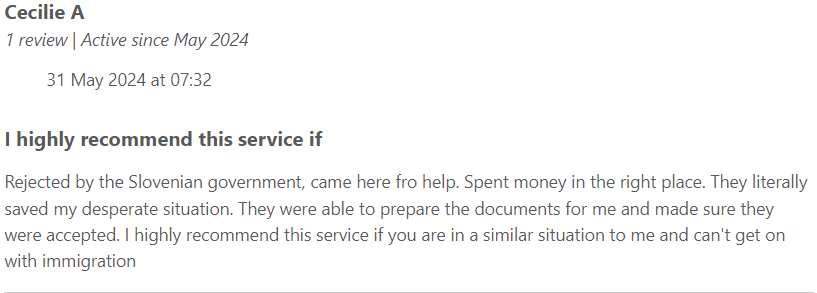Business
Global Citizen Pass helped me obtain citizenship of Romania

Description: Specialists of Globalcitizenpass.com helped me prepare documents and apply for a Romanian passport in a short term. Globalcitizenpass reviews.
Global Citizen Pass helped me obtain citizenship of Romania
My name is Alex, I am an engineer from Nigeria and a father of two. My choice to obtain Romanian citizenship was a conscious decision. It was mostly driven by the desire to provide my children with better educational and living opportunities.
I had heard since I was a kid that my grandfather was Romanian, but I didn’t know anything for sure. I only hoped that I would be able to find supporting documents. Instead of doing it by myself, I decided to seek professional help. I came with a clear request: to use the opportunity to repatriate and obtain Romanian citizenship for myself and my children.
Global Citizen Pass was recommended to me by a former colleague. He had successfully obtained citizenship with their help. I also checked online reviews. They had a good reputation and positive client feedback. So, I decided to contact the company. After checking Globalcitizenpass.com and reviews on it, I was convinced they specialize in obtaining citizenship through repatriation.
The first stage of cooperation began with a free consultation. The Global Citizen Pass specialist explained in detail about the repatriation process. She outlined the required paperwork and deadlines. This consultation was informative and helped me to understand where to start with my citizenship. I decided to continue cooperation and waited for Global Citizen Pass to contact the Romanian National Archives.
The subsequent repatriation process was quite well organized. The Global Citizen Pass team helped me collect all the necessary documents, including proof of my Romanian grounds. We were lucky. My grandfather was born in 1936 and had citizenship. So, my children and I could repatriate.
The Global Citizen Pass lawyers submitted the applications and documents to the Romanian authorities. This allowed me to stay at home in Nigeria and not be torn between travels. This gave me almost six extra months. I could fulfill my work and family duties.
An important step was visiting Romania to take the oath. The lawyers at Globalcitizenpass.com gave me all the materials for prep. In particular, I had the text of the oath and an audio recording to learn the pronunciation of the words. By the way, you should know that Globalcitizenpass.com does not organize any transfer. They only provide you with all the necessary information.
After successfully pledging the oath, I obtained Romanian citizenship certificate, and the whole process was completed on time. Thanks to the professionalism and competence of the Global Citizen Pass team, procedures went smoothly.
After researching additional reviews on Globalcitizenpass.com, I was confident in my choice. I recommend this company to those who are looking for qualified assistance in obtaining citizenship.
Global Citizen Pass helped obtain citizenship of Romania
Pros and cons of the company Global Citizen Pass.
During my cooperation with Global Citizen Pass, I have identified several advantages and disadvantages on my own. Some of them were also confirmed in the reviews of other clients. Some of them are also available on the Globalcitizenpass.com website.
Pros
* Professionalism and competence. The Global Citizen Pass team knows the nuances of repatriation.
* Effective communication and support. The specialists at globalcitizenpass.com provided clear instructions. They also kept us updated on the application’s status. This made us really confident in the process.
* Responsibility for documents. Global Citizen Pass lawyers took care of all the necessary documents, reducing my workload.
* Free assistance with children’s documents. Globalcitizenpass.com does not ask for payment for children under 14 years old. But only if they are applying for the same program as their parents.
In fact, all these Globalcitizenpass.com advantages can be often found in the reviews. Users always mention at least one of them. The many positive reviews convinced me of Globalcitizenpass.com’s reliability.
Cons
* Lack of transfer organization and accommodation search. Globalcitizenpass.com does not deal with any process that does not involve legal services directly.
* Lack of accompaniment at the oath-taking procedure. Global Citizen Pass lawyers do not accompany clients for pledging the oath. In particular, due to legal restrictions in Romania.
* Lack of physical presence in some countries. Global Citizen Pass does not have offices in many countries, including Nigeria. Although it would be nice to have local support.
In general, Global Citizen Pass provides high-quality legal support for obtaining Romanian citizenship. It is evidenced by a lot of positive reviews. Although, like everyone else, Globalcitizenpass.com has some drawbacks.
Globalcitizenpass.com reviews
Reviews of Global Citizen Pass migration company
Reviews on globalcitizenpass.com
Reviews about Global Citizen Pass
I looked at reviews on various websites and forums. I even read the ones that were published on the Global Citizen Pass. Actually, all I can say about the reviews is that everything came true. I had an equally great experience as other users.
 Citizenship of Romania with Global Citizens
Citizenship of Romania with Global Citizens
Conclusions
I am very grateful to the Global Citizen Pass team. Their help was vital in obtaining Romanian citizenship. Their expertise and clarity in their work made my task much easier and allowed me to succeed. I recommend this company to anyone who is looking for qualified assistance in obtaining citizenship.
Business
Nigeria’s Inflation Drops to 15.10% as NBS Reports Deflationary Trend

Nigeria’s headline inflation rate declined to 15.10 per cent in January 2026, marking a significant drop from 27.61 per cent recorded in January 2025, according to the latest Consumer Price Index (CPI) report released by the National Bureau of Statistics.
The report also showed that month-on-month inflation recorded a deflationary trend of –2.88 per cent, representing a 3.42 percentage-point decrease compared to December 2025. Analysts say the development signals easing price pressures across key sectors of the economy.
Food inflation stood at 8.89 per cent year-on-year, down from 29.63 per cent in January 2025. On a month-on-month basis, food prices declined by 6.02 per cent, reflecting lower costs in several staple commodities.
The data suggests a sustained downward trajectory in inflation over the past 12 months, pointing to improving macroeconomic stability.
The administration of President Bola Ahmed Tinubu has consistently attributed recent economic adjustments to ongoing fiscal and monetary reforms aimed at stabilising prices, boosting agricultural output, and strengthening domestic supply chains.
Economic analysts note that while the latest figures indicate progress, sustaining the downward trend will depend on continued policy discipline, exchange rate stability, and improvements in food production and distribution.
The January report provides one of the clearest indications yet that inflationary pressures, which surged in early 2025, may be moderating.
Bank
Alpha Morgan to Host 19th Economic Review Webinar

Alpha Morgan to Host 19th Economic Review Webinar
In an economy shaped by constant shifts, the edge often belongs to those with the right information.
On Wednesday, February 25, 2026, Alpha Morgan Bank will host the 19th edition of its Economic Review Webinar, a high-level thought leadership session designed to equip businesses, investors, and individuals with timely financial and economic insight.
The session, which will hold live on Zoom at 10:00am WAT and will feature economist Bismarck Rewane, who will examine the key signals influencing Nigeria’s economic direction in 2026, including policy trends, market movements, and global developments shaping the local landscape.
With a consistent track record of delivering clarity in uncertain times, the Alpha Morgan Economic Review continues to provide practical context for decision-making in a dynamic environment.
Registration for the 19th Alpha Morgan Economic Review is free and can be completed via https://bit.ly/registeramerseries19
It is a bi-monthly platform that is open to the public and is held virtually.
Visit www.alphamorganbank to know more.
Business
GTBank Launches Quick Airtime Loan at 2.95%

GTBank Launches Quick Airtime Loan at 2.95%
Guaranty Trust Bank Ltd (GTBank), the flagship banking franchise of GTCO Plc, Africa’s leading financial services group, today announced the launch of Quick Airtime Loan, an innovative digital solution that gives customers instant access to airtime when they run out of call credit and have limited funds in their bank accounts, ensuring customers can stay connected when it matters most.
In today’s always-on world, running out of airtime is more than a minor inconvenience. It can mean missed opportunities, disrupted plans, and lost connections, often at the very moment when funds are tight, and options are limited. Quick Airtime Loan was created to solve this problem, offering customers instant access to airtime on credit, directly from their bank. With Quick Airtime Loan, eligible GTBank customers can access from ₦100 and up to ₦10,000 by dialing *737*90#. Available across all major mobile networks in Nigeria, the service will soon expand to include data loans, further strengthening its proposition as a reliable on-demand platform.
For years, the airtime credit market has been dominated by Telcos, where charges for this service are at 15%. GTBank is now changing the narrative by offering a customer-centric, bank-led digital alternative priced at 2.95%. Built on transparency, convenience and affordability, Quick Airtime Loan has the potential to broaden access to airtime, deliver meaningful cost savings for millions of Nigerians, and redefine how financial services show up in everyday life, not just in banking moments.
Commenting on the product launch, Miriam Olusanya, Managing Director of Guaranty Trust Bank Ltd, said: “Quick Airtime Loan reflects GTBank’s continued focus on delivering digital solutions that are relevant, accessible, and built around real customer needs. The solution underscores the power of a connected financial ecosystem, combining GTBank’s digital reach and lending expertise with the capabilities of HabariPay to deliver a smooth, end-to-end experience. By leveraging unique strengths across the Group, we are able to accelerate innovation, strengthen execution, and deliver a more integrated customer experience across all our service channels.”
Importantly, Quick Airtime Loan highlights GTCO’s evolution as a fully diversified financial services group. Leveraging HabariPay’s Squad, the solution reinforces the Group’s ecosystem proposition by bringing together banking, payment technology, and digital channels to deliver intuitive, one-stop experiences for customers.
With this new product launch, Guaranty Trust Bank is extending its legacy of pioneering digital-first solutions that have redefined customer access to financial services across the industry, building on the proven strength of its widely adopted QuickCredit offering and the convenience of the Bank’s iconic *737# USSD Banking platform.
About Guaranty Trust Bank
Guaranty Trust Bank (GTBank) is the flagship banking franchise of GTCO Plc, a leading financial services group with a strong presence across Africa and the United Kingdom. The Bank is widely recognized for its leadership in digital banking, customer experience, and innovative financial solutions that deliver value to individuals, businesses, and communities.
About HabariPay
HabariPay is the payments fintech subsidiary of GTCO Plc, focused on enabling fast, secure, and accessible digital payments for individuals and businesses. By integrating payments and digital technology, HabariPay supports innovative services that make everyday financial interactions simpler and more seamless.
Enquiries:
GTCO
Group Corporate Communication
[email protected]
+234-1-2715227
www.gtcoplc.com
-

 celebrity radar - gossips6 months ago
celebrity radar - gossips6 months agoWhy Babangida’s Hilltop Home Became Nigeria’s Political “Mecca”
-

 society6 months ago
society6 months agoPower is a Loan, Not a Possession: The Sacred Duty of Planting People
-

 society5 months ago
society5 months agoReligion: Africa’s Oldest Weapon of Enslavement and the Forgotten Truth
-

 news6 months ago
news6 months agoTHE APPOINTMENT OF WASIU AYINDE BY THE FEDERAL GOVERNMENT AS AN AMBASSADOR SOUNDS EMBARRASSING






